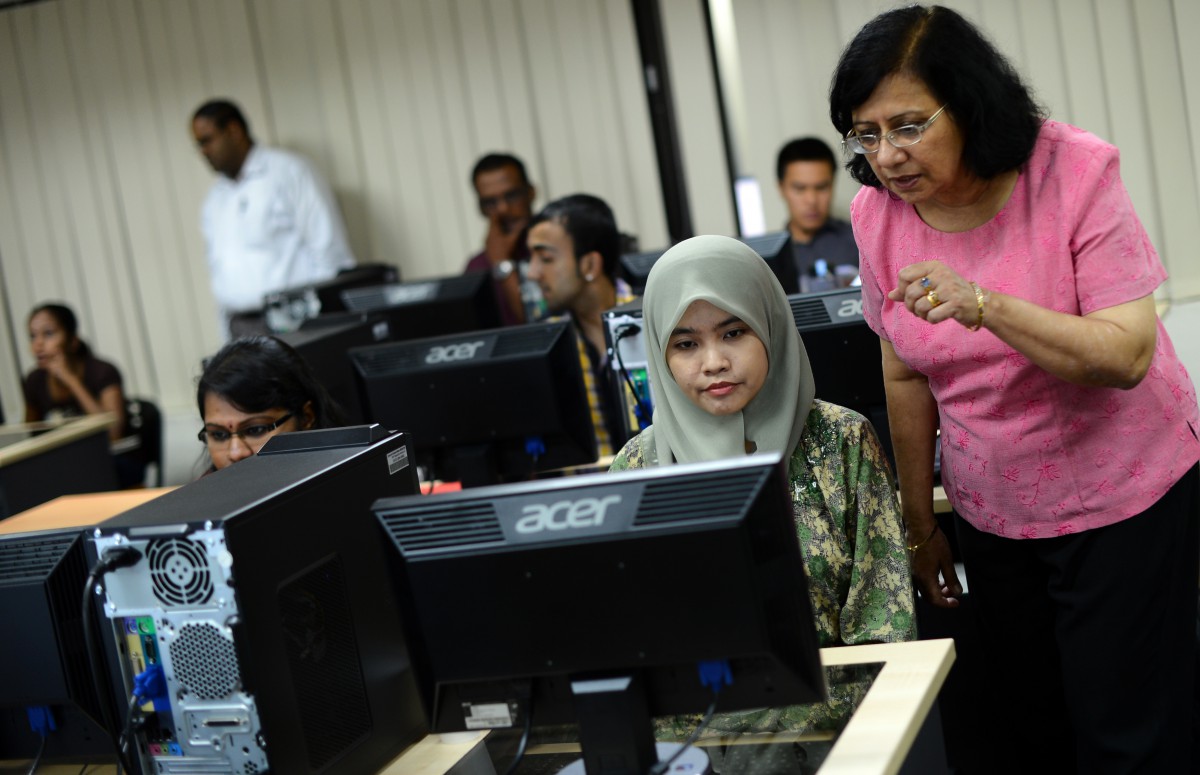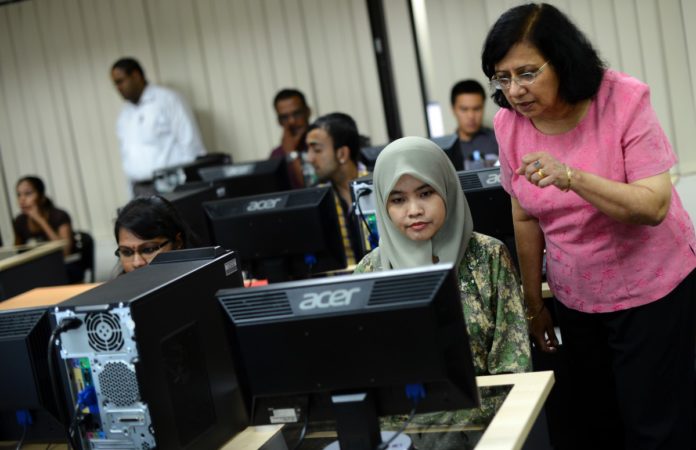WE’VE all heard it before. Most of us will have had it drilled into us by our parents while growing up.
“Go to school, commit to your education, get good grades,” the idea being you’ll have more opportunities in later life and you can fulfil that old promise that you can be whatever you want to be.
But what if that’s not true?
What if your education is nothing more than a postcode lottery? And where you’re born will determine your educational standards and, as a result, your future prospects?
A ‘learning crisis’
There are few regions of the world where this is truer than Southeast Asia – home to some of the starkest contrasts in educational quality on the planet.
According to the latest Programme for International Student Assessment (Pisa) rankings, the region has an incredibly broad range of educational standards, from the very best in the world to some of the worst.
Singapore aced everything, coming number one in reading, maths and science. In comparison, out of the 70 countries surveyed, Indonesia languished in the mid-60s for all categories. Thailand wasn’t much better, ranking in the 50s for all.
SEE ALSO: Is Generation Z ready for employment?
“We have a learning crisis,” said Professor S. Gopinathan, academic adviser at Singapore-based education think-tank HEAD Foundation.
For the last 30 years, the focus has been on expanding access to education across the region; increasing educational opportunities and ensuring gender equality, Gopinathan told Asian Correspondent.
While governments have achieved this with impressive results, reaching almost 100 percent enrolment, the standards aren’t there and many countries in the region just aren’t equipped to take the next step in providing relevant education for today’s economy.

Students prepare for an exam in front of their computers at Kuala Lumpur-based Asia e University (AeU). August 27, 2012. Source: Saeed Khan/AFP
A study by Microsoft and IDC on the digital transformation of the economy suggested that 85 percent of jobs in Asia Pacific will be transformed in the next three years.
“There is a learning crisis even though enrolments have gone up and even though educational expenditure has grown,” he said.
“We talk about ICT like it’s something normal in places like Singapore in a developed context. But in many of these countries, there is just not the bandwidth, there’s not the infrastructure, there’s not the teacher preparation that would be able to exploit that.”
Too little, too late
But it’s not simply an infrastructure or expenditure issue.
As the economy shifts to a more services-based economy and the nature of work changes so rapidly, schools that are already struggling with the basics are struggling to keep pace.
“People are in school but are they learning? What are they learning?” Gopinathan said.
“Even in those areas [of maths, language and science] they are not being mastered adequately. And now we load on to that school the 21st century competencies of critical and creative thinking and all the rest of it.”
This is not a problem restricted to only those countries with poor educational standards. It appears this is almost universal.
Speaking to young professionals in Singapore, they also shared concerns that their public school education in the city-state did not prepare them for the job market that was waiting for them when they graduated.
SEE ALSO: Which Singapore graduates are most employable in the world?
“No, I do not think so,” Isabel Leong (not her real name) said when asked if she thought her Singaporean education had prepared her for work.
“I find the education system focuses too much on theory and not as much on life skills. The streaming and grouping of students on their learning abilities (in theory) also do not encourage students to pursue their other talents which are non-academic.”
This was echoed by Eugene Lim, another Singaporean who feels there is too much emphasis on theoretical knowledge over practical experience, leaving him lacking once he entered the work environment.
“I felt I had no one to guide me in school and had to learn a lot of life skills from my work colleagues and mentors instead,” he said.
To bridge the gap between education and skills, many people choose to go to university. Especially those in countries with lower educational attainment.
The public perception in these poorer countries is that the public system has failed them and the only way parents feel they can prepare their children for is to send them to college, Gopinathan said.
Enrolment in tertiary education has skyrocketed across the region. Universities in East and Southeast Asia have experienced significant expansion in the last few decades with enrolment in higher education in Asia increasing by over 50 percent in the last 10 years.
Graduate unemployment
But even making the decision to attend college or university can come with risks and doesn’t always have the desired outcome.
Professor Gopinathan says a glut of private colleges have opened up in Indonesia and Thailand to capitalise on the influx of prospective students. He warns they provide sub-standard education and offer degrees that are not relevant.
Students are graduating in droves, qualified for jobs that don’t even exist in their home countries.
Even a relevant degree from a reputable university doesn’t guarantee you a place in your chosen field.
While a degree can give you the technical know-how, that’s not necessarily all employers are looking for.
At a time when the job market is changing so quickly – bear in mind, 65 percent of children entering primary school today will be employed in jobs that do not yet exist – technical knowledge ages fast, and graduates need other skills to be able to adapt.
SEE ALSO: Millennials are ‘uneasy’ about the future, have dim view of employers
“Employers today are looking for not just technical expertise and knowledge, but also key 21st century competencies such as communication skills, critical thinking, innovation, adaptability and more to take on the challenges of this fast-changing economy,” Rob Bryson, Managing Director at Robert Walters Singapore, told Asian Correspondent.
“Many young people we speak with today have the right knowledge and qualifications – but they need to be able to prove to employers that they have the 21st century skills to take on whatever the future brings.”
Richer countries are able to bridge this gap. Singapore has launched a SkillsFuture programme in which the government is investing SG$70 million (US$50 million) over three years to train Singaporeans in key evolving sectors such as data analytics and cybersecurity.
This puts Singaporeans at a significant advantage to those people in countries lacking the resources or political will to implement similar plans at home.

Indonesia President Joko Widodo (C) talks with children as he visits a temporary shelter for people who live near Mount Agung, a volcano on the highest alert level, on the resort island of Bali, in Karangasem, Indonesia, September 26, 2017. Source: Reuters/Agus Suparto
Indonesia’s President Joko Widodo is working to change this as he has made human resources development his number two priority after infrastructure. He has already implemented a vocational school and training programme.
He has also criticised universities, particularly economics faculties, for not pursuing innovation in the face of a changing world.
“Economics faculties only offer limited programmes like accountancy, management and economic development, while the world has already changed,” he said in 2017.
But the training programme is still in its early stages, and for those already falling through the gaps, the options can be limited.
Time to get self-sufficient
To avoid your country’s education system dictating your future prospects, recruiters have some advice.
Robert Walters recruitment heads in both Indonesia and Thailand stressed the importance of learning business English and language skills to give candidates a competitive edge in a global market.
“Language skills will make them attractive to both international companies and Asian companies looking to expand overseas,” said Gerrit Bouckaert, Robert Walters managing director for Thailand and Vietnam.
“Having a strong grasp of both Thai and English will help ease both internal and external communications and allow them to stand out among the competition.
“At the same time, Japanese and Mandarin can also be an asset for such companies as it is used significantly.”
Another suggestion is for graduates to pursue internships to gain valuable industry experience and make sure they’re up to date with the latest tech. Basically, anything they can do to learn how to adapt to different working cultures and environments to ensure they stay relevant in a fast-evolving economy.
And in an increasingly globalised and connected world where knowledge-sharing, collaboration and innovation have become crucial to progress, how to embark on these endeavours should no longer need to be taught.





